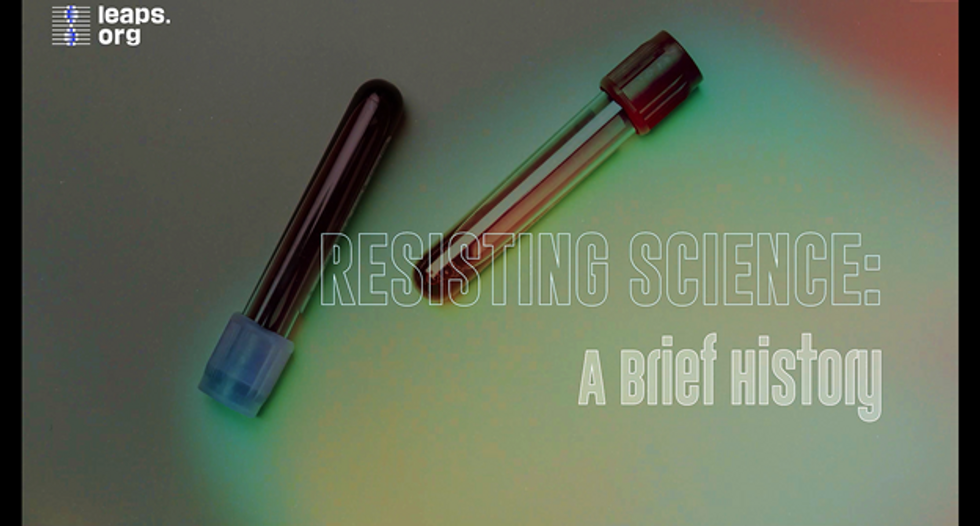Resisting Science: A Brief History

In this new video, we capture examples from history when people rejected scientific breakthroughs at first, only for the march of progress to continue.
What makes people turn against science? After two years of a global pandemic, the world has never felt more divided on questions of science. But this is not a new phenomenon. People have resisted scientific and technological advances throughout history.
This video by Leaps.org, with support from the Gordon and Betty Moore Foundation, captures noteworthy examples from history when people rejected science. What do these cases have in common? Scientific breakthroughs can be revolutionary, but revolutions can be disorienting and anxiety-producing. They transform our livelihoods, culture and even our understanding of what it means to be human. But there's reason for optimism. Many of history’s controversies were overcome. Science has a way of enduring, because it changes things for the better.
How to have a good life, based on the world's longest study of happiness
In 1938, Harvard began an in-depth study of the secrets to happiness. It's still going, and in today's podcast episode, the study's director, Bob Waldinger, tells Leaps.org about the keys to a satisfying life, based on 85 years of research.
What makes for a good life? Such a simple question, yet we don't have great answers. Most of us try to figure it out as we go along, and many end up feeling like they never got to the bottom of it.
Shouldn't something so important be approached with more scientific rigor? In 1938, Harvard researchers began a study to fill this gap. Since then, they’ve followed hundreds of people over the course of their lives, hoping to identify which factors are key to long-term satisfaction.
Eighty-five years later, the Harvard Study of Adult Development is still going. And today, its directors, the psychiatrists Bob Waldinger and Marc Shulz, have published a book that pulls together the study’s most important findings. It’s called The Good Life: Lessons from the World’s Longest Scientific Study of Happiness.
In this podcast episode, I talked with Dr. Waldinger about life lessons that we can mine from the Harvard study and his new book.
Listen on Apple | Listen on Spotify | Listen on Stitcher | Listen on Amazon | Listen on Google
More background on the study
Back in the 1930s, the research began with 724 people. Some were first-year Harvard students paying full tuition, others were freshmen who needed financial help, and the rest were 14-year-old boys from inner city Boston – white males only. Fortunately, the study team realized the error of their ways and expanded their sample to include the wives and daughters of the first participants. And Waldinger’s book focuses on the Harvard study findings that can be corroborated by evidence from additional research on the lives of people of different races and other minorities.
The study now includes over 1,300 relatives of the original participants, spanning three generations. Every two years, the participants have sent the researchers a filled-out questionnaire, reporting how their lives are going. At five-year intervals, the research team takes a peek their health records and, every 15 years, the psychologists meet their subjects in-person to check out their appearance and behavior.
But they don’t stop there. No, the researchers factor in multiple blood samples, DNA, images from body scans, and even the donated brains of 25 participants.

Robert Waldinger, director of the Harvard Study of Adult Development.
Katherine Taylor
Dr. Waldinger is Clinical Professor of Psychiatry at Harvard Medical School, in addition to being Director of the Harvard Study of Adult Development. He got his M.D. from Harvard Medical School and has published numerous scientific papers he’s a practicing psychiatrist and psychoanalyst, he teaches Harvard medical students, and since that is clearly not enough to keep him busy, he’s also a Zen priest.
His book is a must-read if you’re looking for scientific evidence on how to design your life for more satisfaction so someday in the future you can look back on it without regret, and this episode was an amazing conversation in which Dr. Waldinger breaks down many of the cliches about the good life, making his advice real and tangible. We also get into what he calls “side-by-side” relationships, personality traits for the good life, and the downsides of being too strict about work-life balance.
Show links
- Bob Waldinger
- Waldinger's book, The Good Life: Lessons from the World's Longest Scientific Study of Happiness
- The Harvard Study of Adult Development
- Waldinger's Ted Talk
- Gallup report finding that people with good friends at work have higher engagement with their jobs
- The link between relationships and well-being
- Those with social connections live longer
The Friday Five: A new blood test to detect Alzheimer's
A new blood test has been developed to detect Alzheimer's. Other promising studies covered in this week's Friday Five include: vets with PTSD can take their psychologist anywhere with a new device, intermittent fasting could improve circadian rhythms, a new year's resolution for living longer, and a discovery in 3-D printing eye tissue.
The Friday Five covers five stories in research that you may have missed this week. There are plenty of controversies and troubling ethical issues in science – and we get into many of them in our online magazine – but this news roundup focuses on scientific creativity and progress to give you a therapeutic dose of inspiration headed into the weekend.
Listen on Apple | Listen on Spotify | Listen on Stitcher | Listen on Amazon | Listen on Google
Here are the promising studies covered in this week's Friday Five:
- A blood test to detect Alzheimer's
- War vets can take their psychologist wherever they go
- Does intermittent fasting affect circadian rhythms?
- A new year's resolution for living longer
- 3-D printed eyes?


